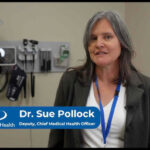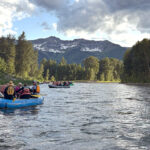Home »

We are what we eat and that could have dire consequences
 “Perceptions,” by Gerry Warner
“Perceptions,” by Gerry Warner
Op-Ed Commentary
Want to save the world?
Many people do and they advocate all kinds of ways to do it. Ban plastics. Impose a carbon tax. Get rid of gasoline vehicles. Tear up the pipelines. Stop flying. Plant more trees. Get rid of capitalism, socialism and all the other “isms.” Lock up Trump. Stop eating meat. Ahh . . . now we’re getting somewhere.
Nonsense, you say. Well wipe that smirk off your face because of all the things listed above the last item on the list above may well come the closest to being the silver bullet that will save the planet and deliver us to Eden, Nirvana or whatever particular paradise you prefer.
You see there’s an insidious force contributing to climate change that 98% of the world’s scientists, not to mention the Intergovernmental Panel on Climate Change say is threatening our planet. Within a decade or two, these learned professionals insist the Earth is facing catastrophe, not unlike the catastrophic fires burning in California and the Amazon right now. And a major factor in this catastrophe prediction is not what many of us would ever think or dream in our darkest hours.
Farting cows!
Yes, you read that right. Farting and burping cows belching methane gas into our already polluted atmosphere. Methane, in case you don’t know, is a far stronger greenhouse gas (GHC) than carbon dioxide; 25 times stronger. So, put down that toxic burger you’re about to chomp into. Do you want to destroy the Earth? Is veganism the wave of the future? It just might be as horrible as that is to contemplate, says this long-time meat eater.
In case you think I’m crazy, get yourself a Sept. 30 issue of The New Yorker magazine or do a little Google research yourself. Entitled ‘Value Meal,’ The New Yorker article is a searing indictment of the world-wide industrial cattle industry and what it’s doing to our rapidly warming planet. Here’s just a few “facts” asserted which I frankly hope are false:
– One-third of the world’s arable land is used to grow cattle feed.
– Cattle are responsible for 14.5% of global greenhouse gas (GHG) emissions.
– In the last 25 years a world-wide forested area larger than South America has been cleared or burnt to create pasture for cattle.
– Every four pounds of beef you eat contributes as much to atmospheric global warming as flying from New York to London. Yeech!
And who’s making these astonishing claims? Well, he’s Dr. Pat Brown, a 65-year-old emeritus professor in biochemistry from Stanford University, a long-time meat eater himself and a marathon runner. “The use of animals in food production is by far the most destructive technology on Earth. We see our mission as the last chance to save the planet from environmental catastrophe.” Well, you can’t accuse him of mincing words. I was so gobsmacked by what Brown said in The New Yorker article that I did a bit of Google research myself. Here’s what I found.
According to The Scientific American, the industrial production of meat uses huge amounts of fertilizer, fuel, pesticides, water and land “while releasing greenhouse gases, manure and a range of toxic chemicals into our air and water.” How do climate change deniers respond to that? Deny, deny, of course.
The Scientific American article goes on to say that eating red meat and lamb produces 10 to 40 times more GHC emissions than eating vegetables and grain. Chew on that one if you will. (Forgive me.)
“Eating meat has dire consequences for the planet,” says a Jan. 16, 2019 National Geographic article quoting an article in the prestigious British Medical Journal The Lancet which says scientists and food experts are scrambling to devise a diet that can feed 10 billion people on the planet by 2050.
There are more articles like this. Many more, but you can find them yourself. What I will tell you is that the aforementioned Professor Brown was a key member of the team that came up with the “Impossible Burger,” a concoction of grain, vegetables and chemicals without meat that can be purchased here in Cranbrook at one of our fast food eateries on the Strip. I’ve tried it and it tasted okay to me, but I’m no gourmet and some may have a different opinion.
But I confess to feeling somewhat alarmed by the dire predictions some of these scientists and food experts are making. I don’t want to contribute to the Earth’s destruction as I’m sure you don’t. But what the hell does all this mean? Do we have to become vegetarians or vegans to save the planet? To me at least that sounds like hell on Earth. Who wants that?
All I can say is the next decade or two are going to be damn interesting.
– Gerry Warner is a retired journalist, who is looking forward to making a warm and tasty beef stew for the cold weather we’ve been experiencing.







